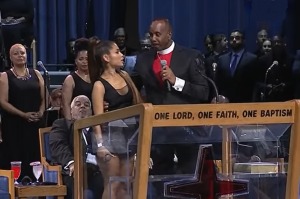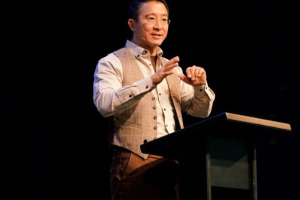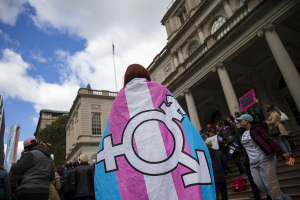When Feminism Kills — Abortion As 'The Lesser Evil'
"If you are willing to die for a cause, you must be prepared to kill for it, too." That statement, published for all the world to see, perfectly distills the inescapable logic of the abortion rights argument. It is based on a willingness to kill - and on the horrifying audacity to call this killing "the lesser evil."
Moral earthquakes, like earthquakes of the geophysical variety, most often occur suddenly and without warning. At one moment, the moral argument is framed in conventional and familiar ways. Just an instant later, all is changed. An article that appears in the June 30, 2010 edition of The Times [London] represents a moral earthquake that resets an entire issue - and that issue is abortion. This chilling essay is hard to read, but impossible to ignore. To read it is to feel the moral ground shift under your feet.
In "Yes, Abortion is Killing. But It's the Lesser Evil," writer Antonia Senior acknowledges that an unborn child at any stage is a human life. But she then proceeds to assert that feminism is more important than life, and that, when necessary, women must be willing to kill for the feminist cause even as they are willing to die for it.
Visiting the Tower of London, Senior observed an exhibit "that asks visitors to vote on whether they would die for a cause." Would she die for any cause? She considers a range of issues and then settles on just one: Feminism and its central doctrine of "reproductive rights."
"Standing where religious martyrs were held and tortured in Britain's turbulent reformation," she writes, "I could think of one cause I would stake my life on: a woman's right to be educated, to have a life beyond the home and to be allowed by law and custom to order her own life as she chooses. And that includes complete control over her own fertility."
There is a bracing honesty in Antonia Senior's argument. She admits that this "absolutist position is under siege," even in her own mind. "Something strange" happened to this belief, so central to the claims of the feminist movement. That "something strange," we soon learn, is her experience of becoming a mother.
Once, Senior had argued without reservation or moral qualms that the unborn child is not a baby, but merely a fetus - the standard argument of pro-abortion forces. "Then came a baby, and everything changed," she relates. "Having a baby paints the world in an entirely different hue," she explains.
Indeed, the experience of having a child convinced Senior that the inhabitant of the womb is indeed a human life. Responding to a recent British medical report claiming that fetuses feel no pain before 24 weeks of gestation, she correctly observes that this has nothing to do with the fundamental issue at stake. "Either a fetus is life from conception, or it is not," she rightly asserts, "ability to feel pain is not, in itself, a defining factor."
Her experience of giving birth to a daughter redefined that issue. "What seems increasingly clear to me is that, in the absence of an objective definition, a fetus is a life by any subjective measure," she writes. "My daughter was formed at conception, and all the barely understood alchemy that turned the happy accident of that particular sperm meeting that particular egg into my darling, personality-packed toddler took place at that moment. She is so unmistakably herself, her own person - forged in my womb, not by my mothering."
By any measure, that is a heart-warming expression of moral insight. Antonia Senior now knows and publicly affirms that "a fetus is a life." With that assertion, she breaks ranks with the pro-abortion activists and apologists who argue vociferously that the unborn child is nothing more than "potential" human life. Senior knows better now, and she is bold to say so.
She takes the pro-choice side of the argument to task for the moral evasion and dishonesty of arguing against the fact that the fetus is a human life. "Any other conclusion is a convenient lie that we on the pro-choice side of the debate tell ourselves to make us feel better about the action of taking a life."
Honesty of that caliber is rare enough. But what follows is nothing less than breathtaking. Just when she seems to be poised to deliver a clear affirmation of the value and dignity of that unborn human life, she veers into an absolutist argument for abortion rights. Yes, that fetus is a human life, she argues, but that life must yield to the inviolable feminist principle of abortion rights.
You simply cannot "decouple feminism from abortion rights," she insists, adding, "you cannot separate women's rights from their right to fertility control."
Even as she admits that her position on the moral status of the unborn child has been utterly changed, she insists that her absolutist position on abortion rights has not. When it comes down to the right of the fetus to live versus the right of the mother to abort, the abortion right wins.
Abortion, which she acknowledges is the killing of a human life, is defined as "a lesser evil" than the curtailing of abortion rights in the name of liberating women.
"As ever, when an issue we thought was black and white becomes more nuanced, the answer lies in choosing the lesser evil," she assures. "The nearly 200,000 aborted babies in the UK each year are the lesser evil, no matter how you define life, or death, for that matter. If you are willing to die for a cause, you must be prepared to kill for it, too."
You must be prepared to kill for the sake of defending abortion rights? That is exactly what abortion entails - the killing of an unborn child for the sake of asserting a woman's so-called "right to choose."
In this essay, published in one of the world's most venerable newspapers, Antonia Senior goes public with the argument that feminists should just admit that abortion is the killing of a human life, and then they should go on to assert that the right to kill an unborn human life is just the price that must be paid if feminism is to be defended.
"If you are willing to die for a cause, you must be prepared to kill for it, too." That statement, published for all the world to see, perfectly distills the inescapable logic of the abortion rights argument. It is based on a willingness to kill - and on the horrifying audacity to call this killing "the lesser evil."





























